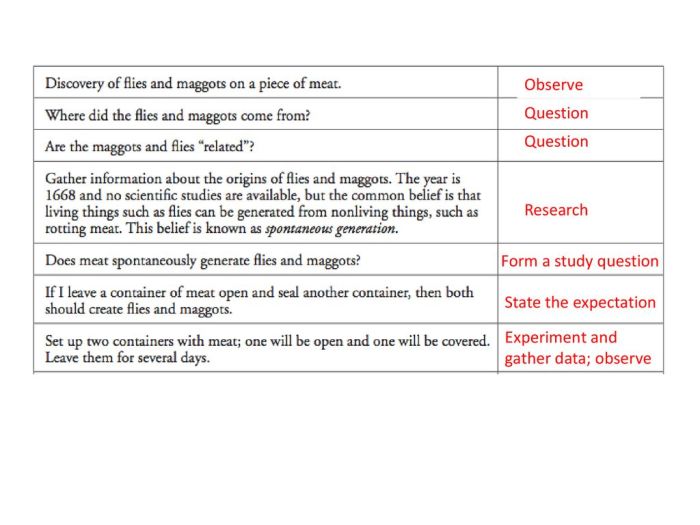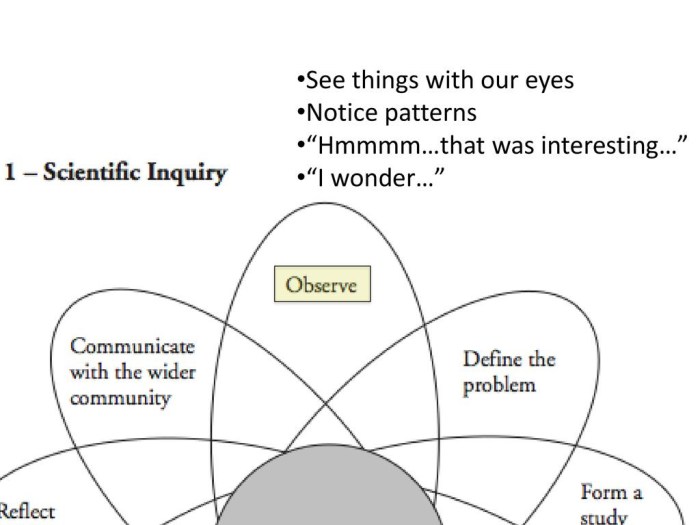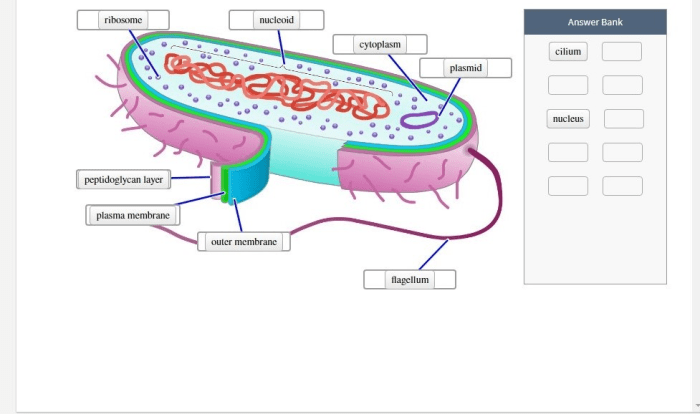The POGIL Scientific Inquiry Answer Key stands as a beacon of guidance, empowering students and educators alike to navigate the complexities of scientific inquiry. This comprehensive resource provides invaluable support, fostering critical thinking and a deeper understanding of scientific concepts.
POGIL, an acronym for Process Oriented Guided Inquiry Learning, embodies an innovative approach to science education. By engaging students in hands-on investigations and collaborative learning, POGIL fosters a deeper comprehension of scientific principles and cultivates essential critical thinking skills.
Overview of POGIL Scientific Inquiry
POGIL (Process Oriented Guided Inquiry Learning) is a pedagogical approach to scientific inquiry that emphasizes the active involvement of students in the learning process. It is based on the constructivist theory of learning, which posits that students construct their understanding of the world through active exploration and experimentation.
POGIL activities are typically designed around a series of scaffolded questions that guide students through the scientific inquiry process. Students work in small groups to investigate a problem or question, and they are encouraged to share their ideas and collaborate with one another.
The teacher’s role is to facilitate the learning process and provide guidance as needed.
Key Principles of POGIL
- Student-centered:POGIL activities are designed to be student-centered, with students taking an active role in their learning.
- Inquiry-based:POGIL activities are based on the scientific inquiry process, with students investigating problems and questions through experimentation and observation.
- Collaborative:POGIL activities encourage students to work together in small groups to share ideas and collaborate on their work.
- Scaffolding:POGIL activities are scaffolded to provide students with the support they need to be successful.
Benefits of Using POGIL
- Improved student learning:POGIL has been shown to improve student learning in science, particularly in terms of conceptual understanding and problem-solving skills.
- Increased student engagement:POGIL activities are engaging and motivating for students, and they help to make science learning more enjoyable.
- Development of critical thinking skills:POGIL activities encourage students to think critically about science concepts and to develop their problem-solving skills.
- Improved communication skills:POGIL activities encourage students to communicate their ideas clearly and effectively.
Structure of a POGIL Scientific Inquiry Lesson: Pogil Scientific Inquiry Answer Key
POGIL scientific inquiry lessons follow a structured format that guides students through the process of scientific inquiry. This format typically consists of five stages: introduction, exploration, explanation, elaboration, and evaluation.
Introduction, Pogil scientific inquiry answer key
The introduction stage sets the context for the lesson and introduces the topic of investigation. It provides students with background information, engages their prior knowledge, and motivates them to explore the topic further.
Example activities:
- Brainstorming
- KWL charts
- Concept mapping
Exploration
During the exploration stage, students actively engage with the materials and data to make observations and collect evidence. They formulate questions, design experiments, and conduct investigations.
Example activities:
- Hands-on experiments
- Simulations
- Data collection and analysis
Explanation
In the explanation stage, students share their findings and discuss the evidence they collected during the exploration stage. They develop explanations and models to account for their observations and connect them to scientific concepts.
Example activities:
- Class discussions
- Presentations
- Concept mapping
Elaboration
The elaboration stage provides students with opportunities to apply their new knowledge and skills to novel situations. They extend their understanding by making connections to other concepts and exploring the implications of their findings.
Example activities:
- Problem-solving exercises
- Design challenges
- Research projects
Evaluation
The evaluation stage allows teachers to assess student learning and provide feedback. Students reflect on their understanding of the concepts covered in the lesson and identify areas for further growth.
Example activities:
- Quizzes
- Projects
- Self-assessments
Role of the Teacher in POGIL Scientific Inquiry
The teacher plays a crucial role in facilitating POGIL scientific inquiry lessons. They are responsible for creating a supportive learning environment where students can actively engage with the material and develop their critical thinking skills.Teachers can support student learning in POGIL by:* Providing clear instructions and expectations for the lesson.
- Guiding students through the inquiry process, including hypothesis generation, data collection, and analysis.
- Facilitating group discussions and encouraging students to share their ideas and perspectives.
- Providing feedback on student work and helping them to identify areas for improvement.
- Assessing student learning and making adjustments to instruction as needed.
By creating a supportive and engaging learning environment, teachers can help students to develop their scientific inquiry skills and foster a lifelong love of learning.
Modeling Scientific Inquiry
One important role of the teacher in POGIL scientific inquiry is to model the scientific inquiry process. This means demonstrating how to ask questions, design experiments, collect and analyze data, and draw conclusions. By modeling the scientific inquiry process, teachers can help students to understand how science works and how to apply it to their own lives.
Facilitating Group Work
Another important role of the teacher in POGIL scientific inquiry is to facilitate group work. This means helping students to work together effectively to complete tasks and achieve learning goals. By facilitating group work, teachers can help students to develop their teamwork skills and learn how to collaborate with others.
Providing Feedback
Feedback is essential for student learning. Teachers can provide feedback to students on their work in a variety of ways, including written comments, verbal feedback, and self-assessment. By providing feedback, teachers can help students to identify areas for improvement and to make progress towards their learning goals.
Assessment in POGIL Scientific Inquiry

Assessment in POGIL scientific inquiry lessons is an integral part of the learning process. It allows teachers to evaluate student understanding of the concepts being taught and to provide feedback to students on their progress. There are a variety of assessment methods that can be used in POGIL lessons, including:
- Pre-assessments:These assessments are given at the beginning of a lesson to determine what students already know about the topic. This information can be used to tailor the lesson to the needs of the students.
- Formative assessments:These assessments are given throughout the lesson to check for understanding. They can be used to identify areas where students are struggling and to provide additional support.
- Summative assessments:These assessments are given at the end of a lesson to assess student learning. They can be used to measure student achievement and to provide feedback to teachers on the effectiveness of their instruction.
When designing assessments for POGIL lessons, it is important to align the assessments with the learning objectives. The assessments should also be designed to be fair and unbiased. Additionally, the assessments should be timely and provide feedback to students in a timely manner.
Assessment Methods
There are a variety of assessment methods that can be used in POGIL scientific inquiry lessons. Some of the most common methods include:
- Written assessments:These assessments can include essays, short answer questions, and problem-solving questions. Written assessments allow students to demonstrate their understanding of the concepts being taught.
- Oral assessments:These assessments can include presentations, debates, and discussions. Oral assessments allow students to share their ideas and to practice their communication skills.
- Performance assessments:These assessments can include laboratory experiments, demonstrations, and projects. Performance assessments allow students to apply their knowledge and skills to real-world situations.
The best assessment method for a particular POGIL lesson will depend on the learning objectives of the lesson and the needs of the students.
Alignment with Learning Objectives
When designing assessments for POGIL lessons, it is important to align the assessments with the learning objectives. The learning objectives should be clearly stated at the beginning of the lesson and should be used to guide the development of the assessments.
The assessments should be designed to measure student achievement of the learning objectives.
For example, if the learning objective is for students to be able to explain the scientific method, then the assessment could be a written essay that asks students to describe the steps of the scientific method and to provide an example of a scientific investigation.
If the learning objective is for students to be able to design and conduct a scientific investigation, then the assessment could be a performance assessment that asks students to design and conduct an experiment to test a hypothesis.
Fairness and Bias
When designing assessments for POGIL lessons, it is important to make sure that the assessments are fair and unbiased. The assessments should be designed to assess all students equally, regardless of their background or abilities. The assessments should also be free of bias, such as bias against certain genders, races, or socioeconomic groups.
One way to ensure that assessments are fair and unbiased is to use a variety of assessment methods. This will help to ensure that all students have an opportunity to demonstrate their understanding of the concepts being taught. Another way to ensure that assessments are fair and unbiased is to use clear and unambiguous language.
The assessments should be written in a way that is easy for all students to understand.
Timeliness and Feedback
When designing assessments for POGIL lessons, it is important to make sure that the assessments are timely and provide feedback to students in a timely manner. The assessments should be given at a time when students have had sufficient time to learn the material.
The feedback should be provided to students in a timely manner so that they can use it to improve their learning.
One way to ensure that assessments are timely is to plan the assessments in advance. The assessments should be scheduled at a time when students will have had sufficient time to learn the material. Another way to ensure that assessments are timely is to use a variety of assessment methods.
This will help to ensure that all students have an opportunity to demonstrate their understanding of the concepts being taught.
One way to ensure that feedback is provided to students in a timely manner is to use a variety of feedback methods. This could include written feedback, oral feedback, or peer feedback. Another way to ensure that feedback is provided to students in a timely manner is to use technology.
Technology can be used to provide students with feedback immediately or to provide feedback at a later time.
Benefits of POGIL Scientific Inquiry
POGIL Scientific Inquiry has gained widespread recognition for its positive impact on student learning. Research studies have consistently demonstrated its effectiveness in enhancing student engagement, critical thinking skills, and content knowledge in science education.
Improved Student Engagement
POGIL’s student-centered approach fosters active participation and collaboration. By working in small groups, students engage in hands-on activities, discussions, and problem-solving tasks. This active learning environment promotes intrinsic motivation, reduces boredom, and increases overall engagement with the subject matter.
Enhanced Critical Thinking Skills
POGIL activities are designed to challenge students to think critically and develop problem-solving abilities. Students are guided to analyze data, evaluate evidence, and construct logical arguments. Through this process, they develop higher-order thinking skills, such as analysis, synthesis, and evaluation.
Increased Content Knowledge
Research has shown that POGIL Scientific Inquiry can significantly improve student content knowledge in science. By actively engaging with the material and working collaboratively, students gain a deeper understanding of scientific concepts and principles. The peer-to-peer interactions also facilitate knowledge retention and recall.
Challenges and Considerations for POGIL Scientific Inquiry

POGIL Scientific Inquiry, while an effective pedagogical approach, is not without its challenges. Educators should be aware of potential obstacles and considerations when implementing POGIL in the classroom.
Student Readiness and Background Knowledge
Students may enter the classroom with varying levels of readiness and background knowledge, which can impact their ability to engage effectively in POGIL activities. It is crucial to assess students’ prior knowledge and provide support for those who may struggle.
- Conduct pre-assessments to gauge students’ understanding of relevant concepts.
- Provide scaffolding and differentiated instruction to support students with diverse learning needs.
Time Constraints
POGIL activities can be time-consuming, particularly in classes with large student populations. Educators must carefully manage time to ensure that students have sufficient opportunities for exploration and discussion.
- Break down POGIL activities into smaller, manageable chunks.
- Set clear time limits for each activity and provide guidance on pacing.
Classroom Management
POGIL activities often involve student collaboration and group work, which can present classroom management challenges. Educators need to establish clear expectations and guidelines for student behavior.
- Set clear rules for group work and expectations for respectful communication.
- Monitor student interactions and provide support when needed.
Assessment
Assessing student learning in POGIL environments can be challenging due to the emphasis on group work and student-led inquiry. Educators must develop assessment strategies that are aligned with the POGIL approach.
- Use a variety of assessment methods, such as individual written assignments, group presentations, and peer evaluations.
- Focus on assessing students’ understanding of scientific concepts and their ability to engage in scientific inquiry.
Resources for POGIL Scientific Inquiry
There are a wide range of resources available to support teachers and students engaged in POGIL scientific inquiry. These resources can provide additional information, guidance, and support for implementing POGIL in the classroom.
The resources can be categorized based on their content and intended audience. Some resources are specifically designed for teachers, providing guidance on how to implement POGIL in their classrooms. Other resources are designed for students, providing support for understanding the scientific inquiry process and engaging in POGIL activities.
Websites
- POGIL website: https://pogil.org/
- National Science Teaching Association (NSTA) POGIL Resources: https://www.nsta.org/about/positions/statements/pogil.aspx
- Science Education Resource Center (SERC) POGIL Resources: https://serc.carleton.edu/pogil/
Articles
- What is POGIL? https://www.ncbi.nlm.nih.gov/pmc/articles/PMC3105039/
- The POGIL Project: A Review of the Literature https://files.eric.ed.gov/fulltext/EJ919047.pdf
- POGIL: A Model for Student-Centered Learning https://www.nsta.org/about/positions/statements/pogil.aspx
Books
- POGIL Activities for High School Chemistry https://www.amazon.com/POGIL-Activities-High-School-Chemistry/dp/0321910028
- POGIL Activities for High School Biology https://www.amazon.com/POGIL-Activities-High-School-Biology/dp/0321839083
- POGIL Activities for AP Biology https://www.amazon.com/POGIL-Activities-Advanced-Placement-Biology/dp/0321930103
FAQ
What is the significance of the POGIL Scientific Inquiry Answer Key?
The POGIL Scientific Inquiry Answer Key provides essential guidance to students and educators, supporting their understanding of scientific concepts and fostering critical thinking skills.
How does POGIL enhance scientific inquiry?
POGIL promotes active learning through hands-on investigations and collaborative group work, fostering a deeper comprehension of scientific principles and cultivating critical thinking abilities.

